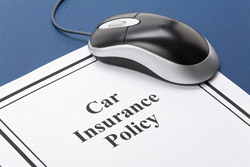
Three Steps to Paying Less for Dodge Daytona Insurance
If we enjoyed shopping for car insurance, we'd do it more often. But the reality is, you probably don't enjoy it and you think it costs too much. Finding insurance for your Dodge Daytona that you can actually afford is probably no different.
Step One: Get Insurance Quotes
Up until about ten years ago, the only way to shop for car insurance was in the office of a local insurance agent where you'd get a hard sell into a policy. Life has gotten easier!
You can now shop all the best car insurance companies and compare rates for a Dodge Daytona and you don't even have to visit each individual website!
Simply click the link below to enter your information. Once complete, you can compare the returned rates and make a decision on which policy to purchase.
Same Limits on Quotes! This tip is very important. The only way to accurately compare rates on your Daytona is to use the same limits of liability as well as deductibles on physical damage coverage. You won't be able to compare rates if you use different values on your quotes.
Step Two: Insider Tips for Finding Cheaper Daytona Insurance
After completing step one and having some rates to compare, you can now focus on policy and lifestyle modifications that will lower your Daytona insurance rates.

- If you belong to a professional organization, check to see if that can earn you a discount. If you're over the age of 55, check to see if they have a senior citizen discount as well.
- If you have a high credit score, you will be rewarded with lower insurance rates. Conversely, if your credit rating is on the low site, your rates will be higher.
- Many insurance companies will give you a small discount if you've recently completed a driver's training course.
- Safety features such as passive restraints and air bag systems help reduce injuries in and accident, and car insurance companies will charge lower rates if these features are present.
- Before a comprehensive or collision claim is paid by your company, you have to pay a deductible first. The more you're willing to pay, the lower your rates will be. Consider raising your deductibles to $500 or even $1,000.
- If you car makes the top ten list of most stolen cars, you might be paying a little extra to insure it.
- Claims that aren't much more than your deductible are better off just being paid out of pocket. If you get into a habit of filing smaller claims, you will pay for it in higher rates.
- If you rent rather than own a home, you may be paying more for car insurance. Homeowners often get lower rates.
- A lead foot will result in higher insurance rates. Slow down, don't get tickets and you'll pay less.
- Youthful or teen drivers that are rated on any vehicle will cost more. The inexperience and tendancy to enjoy going fast is a recipe for an accident.
- Letting your car insurance expire without having new coverage in place is called a "lapse" and will cause your next policy premiums to be higher.
Step Three: Bind Coverage and Cancel your Old Policy
Now that you hopefully have several rates to compare and have made any changes needed to your individual coverages, you can choose the best company to insure your Daytona with.
If you didn't have a prior policy, then you can make the new policy effective any time. But if you're moving bewteen companies and don't want a lapse in coverage, make sure the effective date of the new policy is exactly the same as the cancellation date of the old policy.
When buying a new vehicle, coverage will extend from your existing policy. But if you don't have a car insurance policy, you will want to make sure you have coverage BEFORE you drive off the lot. When driving off the lot, you may have coverage that extends from your current policy. But it will only be equal to the most coverage you have on any vehicle. So if you only carry liability coverage, you won't be covered for full coverage until you specify it on your policy.
Once you have purchased your policy, print out the insurance card that must go in your vehicle. This card fulfills the state law requiring you to prove financial responsibility. High risk drivers may be required to submit an SR-22 with their state DMV's. If you have been convicted of reckless driving, DUI or had an uninsured accident, you may qualify. Make sure your new policy reflects the need for the SR-22 filing.
More Resources for Insurance Buying
The Insurance Information Institute is the industry authority for consumer car insurance information.

